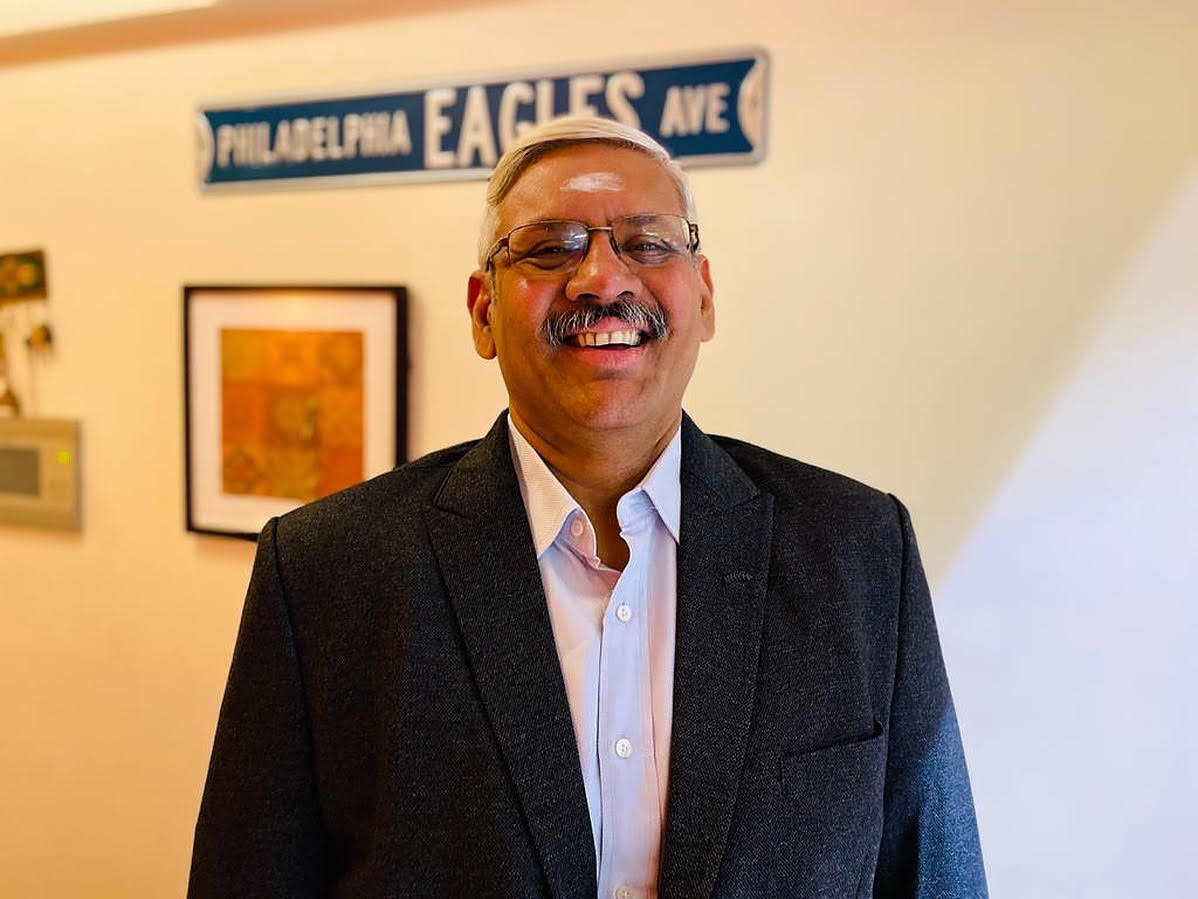As an advocate of sustainable practices across business models, Dr Kumar M Iyer is driving positive outcomes through change management. For this graduate of IIT Bombay, who has a PhD in Metallurgical Engineering from the University of Utah, leading large and diverse teams comes easy as does mentoring. Passionate about Environmental, Social and Governance (ESG) criteria in business policies, Dr Iyer looks at fresh perspectives to any problem. In an e-mail interview with Thrive Global India, he shares what has shaped his beliefs, how leaders and employees should react to the pandemic and his personal Microsteps that help him Thrive. Some excerpts:
Thrive Global India: What is the biggest myth about leadership?
Dr Kumar M Iyer: That Men make better leaders—that’s why most great leaders are men. Leadership is all about maintaining harmony between the various stakeholders in any workplace and women are more attuned to creating harmony. Women are intrinsically endowed with a higher EQ and have the propensity to establish a common ground among a sea of disparate ideas. The success of women leaders in the current Covid-19 pandemic reinforces this belief. However, if we see more men in leadership roles, it has more to do with bias and the proverbial glass ceiling rather than their abilities at excelling in the top job.
TGI: How can leaders promote well-being at the workplace?
KMI: A good leader is one who strives to maintain equilibrium between the stakeholders in the workplace. ESG criteria are a set of standards for a company’s operations that investors use to screen potential investments. Environmental criteria consider how a company performs as a steward of nature. Social criteria examine how relationships are managed with employees, suppliers, customers, and the communities where it operates. Governance deals with a company’s leadership, executive pay, audits, internal controls, and shareholder rights. While ESG compliance is important for the organisation, each facet of ESG compliance is a reflection of practices from the individual workplaces. Good leaders ensure that all activities in their area of influence reflect the organisation’s commitment to these values. A leader ensures that human rights, diversity, employee engagement, transparency, good work life balance and such, are stressed upon and adhered to. This is one of the easiest ways that a leader can promote well-being at the workplace. A leader allows for employees to speak up and be vocal about their thoughts and ideas. By maintaining open channels of communication with their teams, a leader can truly promote well-being at the workplace.
TGI: What is the best professional advice you’ve ever got?
KMI: The best professional advice that I have ever got in my career is to play to the strengths of your team members. Reinforce and magnify the positives and the negatives will soon become redundant. We all run the race of life at our own speeds and we cannot use a single yardstick to measure progress. The best reward that you can get in the workplace is to see the employees you have mentored and supported along their growth path, excel in their roles and come good on the faith that you have reposed in them.
A business practice which is ethical to the core and which is built on achieving ESG compliance will always be a successful business.
Dr Kumar M Iyer
TGI: Do share an efficiency hack that has worked for you?
KMI: One hack which has worked for me, in the past is something that I learnt while undergoing training in Lean Management. It called for empowering teams and allowing them to work on improvements, whilst I’d take the role of a coach, guiding them towards the results rather than doing it myself or even advising them with the course of action. Over a period of time, it translated into what I like to call, “Come Back Later”. By leading the teams to think about the solutions to the problems or challenges they were facing, it ensured productive management of my time, as well. I was only called in to have the results (re-)affirmed rather than get involved with the brainstorming and the solutioning of the problem. This efficiency hack has worked very effectively for me.
It has increased ownership and accountability among the teams and led to a culture where we truly believed that every employee is a leader. What did this lead to? Strengthening the innovation capability of the teams and this continuous improvement culture within the organisation that resulted in a more robust work and business environment.
TGI: When you notice you’re getting too stressed, what do you do to course correct?
KMI: Stress is a part of our everyday lives but there is no reason to be overwhelmed by it. Whenever I am faced with a particularly stressful situation, I take a step back and reflect upon it based upon my Personal Moral Line. My Personal Moral Line is a set of principles, ethical and moral values, which I deem inviolate. The stress arises because of the conflict between the current state and my Personal Moral Line. At such times, I step back a little and measure the situation against what I believe in. This exercise helps to resolve the situation, and the solution manifests itself in a clear series of dos and don’ts. This results in an appropriate and sustainable course of action, importantly, one that resonates with my conscience. This is how I am able to nip the source of stress in its bud.
The only disclaimer which I would like to emphasise, is that this Personal Moral Line, is one which calls for a 100 per cent adherence to, not allowing for even, say a two or five per cent deviation. It does not take long for this small, seemingly inconsequential number, to burgeon into something that is out of control.
TGI: You have been an advocate of sustainable business practices. Do give two reasons why they make more sense today than ever.
KMI: As an advocate of Sustainable Business Practices, I believe that most of the problems that we face today, and those that continue to threaten us in the future, are a direct fallout of a lack of discipline. They can be directly correlated to a deviation from the Quadruple Bottom Line (QBL) comprising the 4 Ps—People, Planet, Profit and Principles.
The QBL provides a roadmap for how businesses, non-profits and Governments can better realise the aspirations of their various stakeholders and ensure ESG and SDG respectively. These trying times are a clarion call for a change in our existing ways of working. We face the current situation because we have based all decisions predominantly on profits, with cursory lip service to the environment and people aspects of business. While profits are no doubt important, our principles as defined by the QBL, are equally important, if we have to build a business practice which is not only sustainable, but also has the legs for the long run.
So, a business practice which is ethical to the core and which is built on achieving ESG compliance will always be a successful business.
There is a distinct lack of trust and transparency in our transactions as individuals and businesses, and that is compounded by the exploitation of the weaker sections of the society which has resulted in an extremely skewed distribution of wealth, widening the chasm, between the richer and poorer sections of society. This reflects a severe erosion in our ethics and principles as our priorities have moved away from equality and fair play to greed and avarice. Profits are no doubt important and are the lifeblood of any business strategy, but this driver has to be balanced by an adherence to human rights, respect for the environment and doing things the right way. We are seeing that those nations and businesses which exhibit a more robust QBL are the ones that are relatively unscathed and are indeed prospering even in the current scenario.
TGI: COVID-19 has given rise to desperate economic situations. What do you face as a leader? And how do you think employees should behave?
KMI: The current economic situation is one that very few of us had ever anticipated and so it is difficult to plan for. However, not only as a leader but as an employee, I feel that the need of the hour is a clear channel of communication. This is true irrespective of the situation. The biggest challenge that we face today is the lack of clear signals and decisiveness in decision making. This has led to confusion and a general loss of confidence among employees.
The biggest problem that I face as a leader is the high degree of uncertainty which exists with respect to the business environment. The lack of definitive markers indicating our course of action makes projections an ordeal. In light of the same, expecting employees to behave rationally is a huge ask unless the leaders have implemented ESG across all levels in the organisation.
TGI: What brings you optimism?
KMI: What brings me optimism, in general, is the maxim, “This too shall pass.” No situation is unsurmountable and we need to find a way to get around or through it.
Another cause for optimism, especially in the current scenario, is the high degree of involvement of the younger generation in the issues that they find relevant. They are not afraid to shake up the status quo and we see them involved in such diverse agenda points such as human rights, climate change, equality, race relations, gender diversity. As long as this spirit exists, I believe that we are on the right path. They are not afraid to question age old dogmas and fight to reclaim their heritage—a vibrant planet which can continue to support life.
Another cause for optimism is the fact that the topics of and around sustainability has barged their way into mainstream discussions. ESG are making a bold statement, so much so, that investment funds are focusing on these as a part of their decision-making process. While these are baby steps for now, I am optimistic of these discussions leading the way forward towards a more equitable society, one based on meritocracy.
TGI: What is your personal policy towards gadgets when working or at night-time?
KMI: Personally, I am not very adept at handling technology. While I can get around the basics of various gadgets, I am quite addicted to certain social media channels and am fanatical about my dependence on them. I am trying to restrict my access to these channels and am slowly gaining control on my addiction.
TGI: Tell us about a small change you have made in your life to improve it.
KMI: One change which I have incorporated in my life over the past couple of years is reducing the dependence on plastic as a part of my everyday life. I believe that this is my own way of making a difference. A second change that I have made has been becoming more vocal about sustainability and spreading the word about the importance of the components of the QBL—People, Planet, Profit and Principles—in our everyday, transactional behaviour.


